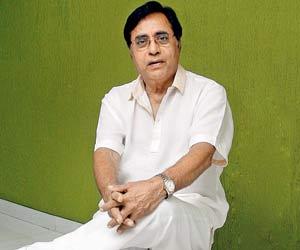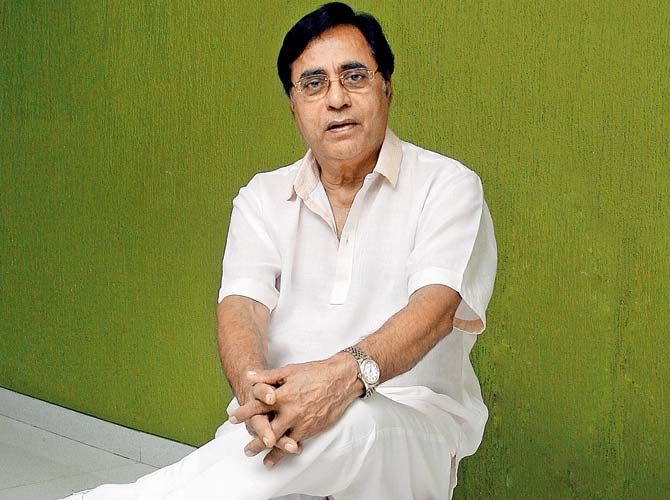A birth anniversary, like any other; unsurprisingly, we hear the same voice everywhere we go, seven years after he passed away


Jagjit Singh
ADVERTISEMENT
 Since Jagjit Singh had composed an album, Samvedna, based on the then Prime Minister Atal Bihari Vajpayee's poetry, anchor Rajat Sharma - in the customarily cheeky tone of his popular TV show Aap Ki Adalat - asked Jagjit if he had done this to curry favours with the government. "They awarded me a Padma Bhushan," Jagjit said. "Now I should aim for Padma Vibhushan!" Responding to the same line of questioning on whether he held any political ambitions, Jagjit smiled, "I wouldn't mind (a back-door) entry into the Rajya Sabha."
Since Jagjit Singh had composed an album, Samvedna, based on the then Prime Minister Atal Bihari Vajpayee's poetry, anchor Rajat Sharma - in the customarily cheeky tone of his popular TV show Aap Ki Adalat - asked Jagjit if he had done this to curry favours with the government. "They awarded me a Padma Bhushan," Jagjit said. "Now I should aim for Padma Vibhushan!" Responding to the same line of questioning on whether he held any political ambitions, Jagjit smiled, "I wouldn't mind (a back-door) entry into the Rajya Sabha."
Watching this show reminded me of an episode that writer Khushwant Singh himself narrates in his brilliant autobiography, Truth Love And A Little Malice, where Sanjay Gandhi asks the writer what he would like in return for having unabashedly supported the Emergency in 1975: Rajya Sabha seat, or editorship of the Hindustan Times? "Both," Khushwant shoots back!
Which brings me to the point on what's common between the late Khushwant and Jagjit, besides that they were both Sikhs, full of self-deprecating humour, enjoyed the company of friends and whiskey, and worked really hard to entertain their audiences: They never took their greatness seriously.
It's hardly a surprise then that while Khushwant was a rare Indian writer of his time, who was read enough to make a serious living out of it, Jagjit was arguably 'India's first true rock-star', who didn't depend on Bollywood soundtracks to immeasurably widen his mass appeal, packing halls, traversing continents, and multiple generations.
He did what are called 'private albums', selling, as he called it, "masala" or "churan", alert to his audience's moods, mixing ghazals, with classical music, Punjabi folk, and lots of jokes, so his viewers, regardless of the demographic, inevitably desi (sub-continental), eventually went home happy. And he hustled his way up in showbiz, having performed at people's homes from 1965 until '76, when he cut his first album, the path-breaking Unforgettables, with Chitra Singh.
A fun fact I came across Sathya Saran's book on Jagjit, Baat Niklegi Toh Phir, is that he had even done a walk-on (one-line) part in a film called Aman (1967), with Rajendra Kumar in the lead. Now if you ever get hold of Aman, which by the way had a cameo by Bertrand Russel, you should pause at a crowd sequence, where you'll also spot actor Naseeruddin Shah, in his first screen appearance as well!
Naseer and Jagjit of course came together for one of India's finest TV shows, Gulzar's Mirza Ghalib, where Jagjit, as composer, revived an interest in Ghalib like no one had before. Post early '90s, when his music developed much gravitas, he did the same with a whole galaxy of the finest Urdu poets ever, exhibiting a plethora of emotions, chiefly love, and pain thereof.
His voice had the quality of a "lived experience", as Zakir Hussain puts it in Brahmanand Singh's Jagjit documentary, Kaagaz Ki Kashti (2017) - an astoundingly skilled work at biographical story-telling, where you learn foremost how the popular singer-composer was unique, because he could "equally have the purist, and the layman, on his side."
Through an excellent set of amateur tapes, rare home videos, inspired by Asif Kapadia's Amy (2015), Brahmanand's film is more about the man than his music alone, in contrast to the masterpiece Pancham Unmixed (2008), his film on RD Burman - the other trendsetter whose career coincided with Jagjit's, both being incredibly colourful characters, with an immense zest for life, and music. Jagjit, by the way, also loved and bred horses. He enjoyed gambling at casinos - a hobby, I'm told, he shared with Lata Mangeshkar.
I watched portions of Kaagaz Ki Kashti with a nearly moist-eyed crowd at the Kala Ghoda Festival couple of weeks ago, having missed a marathon musical session at the Turf Club to celebrate Jagjit's birthday (February 8). He would have turned 77, which is hardly a landmark year. He passed away in 2011. Author Sathya Saran was giving a talk on Jagjit elsewhere in the city, while some of the top Bollywood singers got together for a tribute concert the following Sunday, even as I hear from the far distance of a late-night bar, a bunch of drunk kids singing, 'Hothon Se Chhoo Lo Tum', a song that inspires the bathroom singer in most of us. As does an entire playlist on my cab - a Jagjit song after another; so simple, yet so deep. It almost feels like he's following us wherever we go.
This is a sign, I suspect, of inevitably eternal resurgence. Call it Malcolm Gladwell's 'Tipping Point' in pop-culture, if you may. Need more evidence? The current IMDb rating, I check, for Brahmanand's film Kaagaz Ki Kashti is 9.4/10. Put in context: Shawshank Redemption (1994), the clichéd public-favourite, perpetually the greatest film ever, ranks 9.3!
Mayank Shekhar attempts to make sense of mass culture. He tweets @mayankw14. Send your feedback to mailbag@mid-day.com
Catch up on all the latest Mumbai news, crime news, current affairs, and also a complete guide on Mumbai from food to things to do and events across the city here. Also download the new mid-day Android and iOS apps to get latest updates
 Subscribe today by clicking the link and stay updated with the latest news!" Click here!
Subscribe today by clicking the link and stay updated with the latest news!" Click here!






